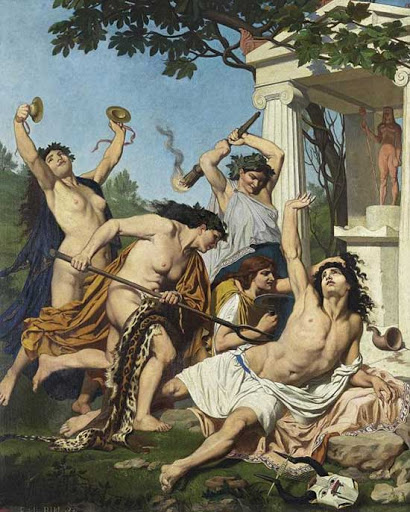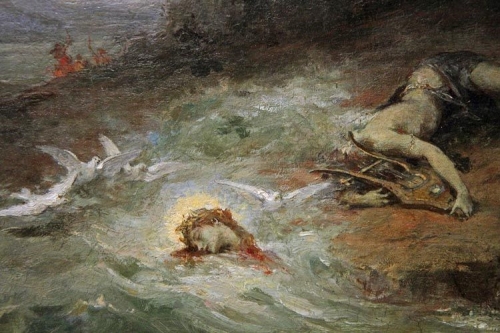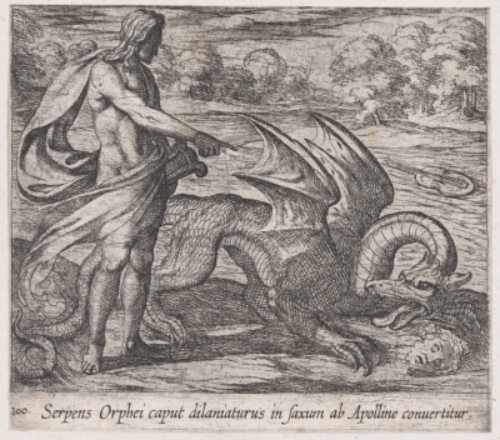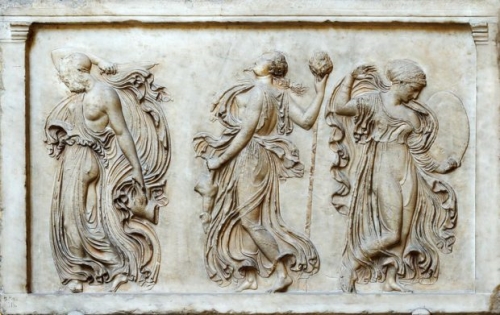|
|
| |
|
| |
| English Literature Plus 2024 |
| |
|
|
BOOK XI THE DEATH OF ORPHEUS *For the death of Orpheus, Ovid combines two traditions: that of the Hellenistic poet Phanocles (fragment 1 Powell), in which Orpheus is killed for rejecting sex and love with women and promulgating that with males, and that he is torn apart by Maenads for dishonoring the god. In Ovid's version his killer are angry at his refusal to marry. WHILE Orpheus sang his minstrel's songs and charmed
The rocks and woods and creatures of the wild
To follow, suddenly, as he swept his strings
In concord with his song, a frenzied band
Of Thracian women, wearing skins of beasts,
From some high ridge of ground caught sight of him.
‘Look!’ shouted one of them, tossing her hair
That floated in the breeze, ‘Look, there he is,
The man who scorns us!’ and she threw her lance
Full in Apollo’s minstrel's face, but, tipped(To strike or hit smartly but lightly; to give a slight blow, knock, or touch to; to tap noiselessly-OED.)
With leaves, it left a bruise but drew no blood.
Another hurled a stone; that, in mid air,
Was vanquished by the strains of voice and lyre
And grovelled at his feet, as if to ask
Pardon for frenzy’s daring. Even so
The reckless onslaught swelled; their fury knew
No bounds; stark madness reigned. And still his singing
Would have charmed every weapon, but the huge
Clamour, the drums, the curving Phrygian fifes,
Hand-clapping, Bacchic screaming drowned the lyre.(9/14)
And then at last, his song unheard, his blood
Reddened the stones. The Maenads first pounced on
The countless birds still spellbound by his song,
The snakes, the host of creatures of the wild,
His glory and his triumph. Next they turned
Their bloody hands on Orpheus, flocking like
Birds that have seen a midnight owl abroad
By day, or in the amphitheatre
Upon the morning sand a pack of hounds
Round a doomed stag. They rushed upon the bard,
Hurling their leaf-dressed lances, never meant
For work like that; and some slung clods, some flints,
Some branches torn from trees. And, lest they lack
Good weapons for their fury, as it chanced,
Oxen were toiling there to plough the land
And brawny farmhands digging their hard fields
Not far away, and sweating for their crop
Seeing the horde of women, they fled and left
Their labour's armoury, and all across
The empty acres lay their heavy rakes,
Hoes and long-handled mattocks. Seizing these,
Those frantic women tore apart the oxen
That threatened with their horns, and streamed to slay
The bard. He pleaded then with hands outstretched
And in that hour for the first time his words
Were useless and his voice of no avail.
In sacrilege they slew him. 
Through those lips
(Great Lord of Heaven!) that held the rocks entranced,
That wild beasts understood, he breathed his last,
And forth into the winds his spirit passed.
The sorrowing birds, the creatures of the wild,
The woods that often followed as he sang,
The flinty(obdurate, unfeeling, hard-hearted-OED) rocks and stones, all wept and mourned
For Orpheus; forest trees cast down their leaves,
Tonsured(To clip or shave the hair of-OED) in grief, and rivers too, men say,
Were swollen with their tears, and Naiads wore,
And Dryads too, their mourning robes of black
And hair dishevelled.(a convention of classical elegy) All around his limbs
Lay scattered. Hebrus’ stream received his head
And lyre, and floating by (so wonderful!) 
His lyre sent sounds of sorrow and his tongue,
Lifeless, still murmured sorrow, and the banks
Gave sorrowing reply. And then they left
Their native river, carried out to sea,
And gained Methymna’s shore on Lesbos' isle.
There, as his head lay on that foreign sand,
Its tumbled tresses dripping, a fierce snake
Threatened, until at last Apollo came
To thwart it as it struck and froze to stone
That serpent’s open mouth and petrified,
Just as they were, its jaws that gaped so wide.

The ghost of Orpheus passed to the Underworld, And all the places that he’d seen before
He recognized again and, searching through
The Elysian fields, he found Eurydice
And took her in his arms with leaping heart.
There hand in hand they stroll, the two together;
Sometimes he follows as she walks in front,
Sometimes he goes ahead and gazes back-
No danger now-at his Eurydice.
Bacchus did not permit this crime to pass
Unpunished, unavenged. Distressed to lose
The minstrel of his mysteries, at once
He fastened in the woods by twisting roots
All the women who had seen that wickedness,
Each at the place of her pursuit, their toes
Drawn down to points forced deep in the firm soil. 
And as a bird, its foot held in a snare
Hidden by a clever fowler, feels it’s caught
And flaps its wings and by its flutterings
Tightens the trap, so each of them was stuck
Fast in the soil and struggled, terrified,
In vain, to escape and as she jerked away,
The lithe(easily bent; flexible, limber, pliant, supple-OED) root held her shackled. When she asked
Where were her toes, her nails, her feet, she saw
The bark creep up her shapely calves. She tried,
Distraught, to beat her thighs and what she struck
Was oak, her breast was oak her shoulders oak;
Her arms likewise you’d think were changed to long
Branches and, thinking so, you’d not be wrong.
|
|
|
 
|
|
|
|
BOOK XI THE DEATH OF ORPHEUS *For the death of Orpheus, Ovid combines two traditions: that of the Hellenistic poet Phanocles (fragment 1 Powell), in which Orpheus is killed for rejecting sex and love with women and promulgating that with males, and that he is torn apart by Maenads for dishonoring the god. In Ovid's version his killer are angry at his refusal to marry. WHILE Orpheus sang his minstrel's songs and charmed
The rocks and woods and creatures of the wild
To follow, suddenly, as he swept his strings
In concord with his song, a frenzied band
Of Thracian women, wearing skins of beasts,
From some high ridge of ground caught sight of him.
‘Look!’ shouted one of them, tossing her hair
That floated in the breeze, ‘Look, there he is,
The man who scorns us!’ and she threw her lance
Full in Apollo’s minstrel's face, but, tipped(To strike or hit smartly but lightly; to give a slight blow, knock, or touch to; to tap noiselessly-OED.)
With leaves, it left a bruise but drew no blood.
Another hurled a stone; that, in mid air,
Was vanquished by the strains of voice and lyre
And grovelled at his feet, as if to ask
Pardon for frenzy’s daring. Even so
The reckless onslaught swelled; their fury knew
No bounds; stark madness reigned. And still his singing
Would have charmed every weapon, but the huge
Clamour, the drums, the curving Phrygian fifes,
Hand-clapping, Bacchic screaming drowned the lyre.(9/14)
And then at last, his song unheard, his blood
Reddened the stones. The Maenads first pounced on
The countless birds still spellbound by his song,
The snakes, the host of creatures of the wild,
His glory and his triumph. Next they turned
Their bloody hands on Orpheus, flocking like
Birds that have seen a midnight owl abroad
By day, or in the amphitheatre
Upon the morning sand a pack of hounds
Round a doomed stag. They rushed upon the bard,
Hurling their leaf-dressed lances, never meant
For work like that; and some slung clods, some flints,
Some branches torn from trees. And, lest they lack
Good weapons for their fury, as it chanced,
Oxen were toiling there to plough the land
And brawny farmhands digging their hard fields
Not far away, and sweating for their crop
Seeing the horde of women, they fled and left
Their labour's armoury, and all across
The empty acres lay their heavy rakes,
Hoes and long-handled mattocks. Seizing these,
Those frantic women tore apart the oxen
That threatened with their horns, and streamed to slay
The bard. He pleaded then with hands outstretched
And in that hour for the first time his words
Were useless and his voice of no avail.
In sacrilege they slew him. 
Through those lips
(Great Lord of Heaven!) that held the rocks entranced,
That wild beasts understood, he breathed his last,
And forth into the winds his spirit passed.
The sorrowing birds, the creatures of the wild,
The woods that often followed as he sang,
The flinty(obdurate, unfeeling, hard-hearted-OED) rocks and stones, all wept and mourned
For Orpheus; forest trees cast down their leaves,
Tonsured(To clip or shave the hair of-OED) in grief, and rivers too, men say,
Were swollen with their tears, and Naiads wore,
And Dryads too, their mourning robes of black
And hair dishevelled.(a convention of classical elegy) All around his limbs
Lay scattered. Hebrus’ stream received his head
And lyre, and floating by (so wonderful!) 
His lyre sent sounds of sorrow and his tongue,
Lifeless, still murmured sorrow, and the banks
Gave sorrowing reply. And then they left
Their native river, carried out to sea,
And gained Methymna’s shore on Lesbos' isle.
There, as his head lay on that foreign sand,
Its tumbled tresses dripping, a fierce snake
Threatened, until at last Apollo came
To thwart it as it struck and froze to stone
That serpent’s open mouth and petrified,
Just as they were, its jaws that gaped so wide.

The ghost of Orpheus passed to the Underworld, And all the places that he’d seen before
He recognized again and, searching through
The Elysian fields, he found Eurydice
And took her in his arms with leaping heart.
There hand in hand they stroll, the two together;
Sometimes he follows as she walks in front,
Sometimes he goes ahead and gazes back-
No danger now-at his Eurydice.
Bacchus did not permit this crime to pass
Unpunished, unavenged. Distressed to lose
The minstrel of his mysteries, at once
He fastened in the woods by twisting roots
All the women who had seen that wickedness,
Each at the place of her pursuit, their toes
Drawn down to points forced deep in the firm soil. 
And as a bird, its foot held in a snare
Hidden by a clever fowler, feels it’s caught
And flaps its wings and by its flutterings
Tightens the trap, so each of them was stuck
Fast in the soil and struggled, terrified,
In vain, to escape and as she jerked away,
The lithe(easily bent; flexible, limber, pliant, supple-OED) root held her shackled. When she asked
Where were her toes, her nails, her feet, she saw
The bark creep up her shapely calves. She tried,
Distraught, to beat her thighs and what she struck
Was oak, her breast was oak her shoulders oak;
Her arms likewise you’d think were changed to long
Branches and, thinking so, you’d not be wrong.
 
|
|
| |
|